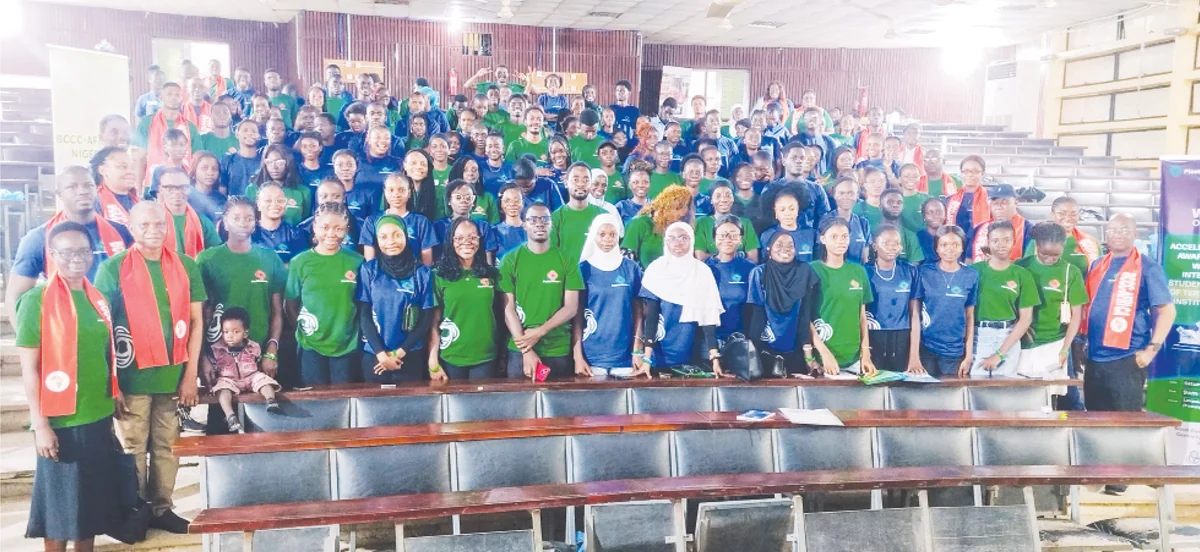With BCCC-Africa’s intervention, students, corps members now equipped to curb plastic pollution nationwide
By Tribune Online
Copyright tribuneonlineng

By: Martin Metieh
The Basel Convention Coordinating Centre for the African Region (BCCC-Africa) has organised a workshop for students of the University of Ibadan to train them on how to create awareness on the dangers of plastic waste and solutions to the menace when they proceed to their compulsory one-year National Youth Service Corps (NYSC) scheme across the country, and for serving corps member currently enrolled in the scheme.
The workshop tagged, “Accelerating Community Awareness on Plastic Waste through Interventions with Students and Graduates of Tertiary Institutions in Ibadan, Nigeria,” is a continuation of a project which commenced earlier this year. Earlier on June 18, BCCC-Africa held a one-day Inception Workshop for a project titled: “Accelerating community awareness on plastic waste through interventions with students and graduates of tertiary educational institutions in Ibadan, Nigeria,” on the campus of the University of Ibadan (UI), Ibadan, Oyo State.
The BCCC-Africa Executive Director, Professor Percy Onianwa, at the project inception, noted that “Nigerian students and youth corps members have never before been utilised in this manner for any community awareness raising programme. The scheme has a high potential for a wide reach within the country. The trainees are also likely to carry on with awareness-building activities even beyond the lifespan of this project.”
He added, “The project is being executed by the BCCC-Africa, with funding provided by the Secretariat of the Basel, Rotterdam and Stockholm Conventions through its third Small Grants Programme (SGP-3) on Plastic Wastes.”
The project aims to engage about 450 final-year students of the University of Ibadan (UI), and 450 final-year students of The Polytechnic Ibadan, and also work with National Youth Service Corps (NYSC) members that are already deployed to serve in the metropolitan city of Ibadan.
The project will also develop educational materials that are suitable for awareness raising and outreach programmes on plastic waste in Nigeria and build the capacities of higher academic institutions’ students and NYSC members for the purpose of engaging them in community awareness through advocating activities on plastic waste and management.
The intensive full day programme held on Saturday, September 20, for students of UI could be broadly divided into two parts, namely ‘problems’ and ‘solutions’ to the plastic waste challenge in Nigeria. The first part with the broad topic of ‘Plastics, Plastic Wastes, Plastic Pollution,’ took them through sub-topics including: ‘Nature of Plastics/Plastic Waste/Single-Use Plastics’, ‘Microplastics and Chemicals in Plastics’, ‘Plastic Pollution: Health Hazards of Plastic Wastes’.
The second part of the session on ‘Managing Plastic Wastes’ dealt with sub-topics including Sorting, Collection and Recycling. Mr Victor Okunola, a recycler from Plastic Edge, said that recycling can become a viable source of income. Professors Adie and Ipeaiyeda spoke on ‘Alternatives to Plastics’ that are less harmful to the environment, such as bamboo, liquid wood and substances that can be added to make plastic biodegradable.
Mr Rafiu Akorede of the Oyo State Ministry of Environment, who spoke on the topic: ‘Managing Plastics in Ibadan,’ mentioned strategies the state government is using for waste management, including decentralised waste collection through waste management consultants, public awareness and advocacy and promoting reusable items.
The ‘Role of Extended Producer Responsibility in Managing Plastic Waste in Nigeria’ was handled by Agharese Onaghise of the Food and Beverage Recycling Alliance (FBRA).
Before she spoke, Prof Onianwa noted that the economics of waste management has changed with the increase in the cost of managing dumpsites. He added that one of the ways to cope with this challenge is the extended producer responsibility.
Onaghise said FBRA, established in 2018, with just four members, now has about 47, adding that the organisation empowers Nigerian industries to manage plastic waste effectively.
Speaking about their experiences, Happiness Abiodun, a 400-level student in the Department of Chemistry, said the workshop was indeed insightful, as she not only learned about the activities of BCCC-Africa but also discovered how plastics can be harmful to the environment, despite their usefulness.
She added, “I am grateful to BCCC-Africa and all the speakers for teaching us how to enlighten secondary school students and market women on plastics recycling.”
She said she planned to use her upcoming national service year (NYSC) to initiate a group of corps members that would embark on an enlightenment campaign to students and market women. “I also plan to introduce clubs in secondary schools that will focus on plastic recycling, and also bring in resource persons to teach them. Secondary school students are well-exposed these days, and I believe they will catch the message quickly,” she added.
David Adewale, a Geology student of the university, said he was now fully aware of the need to reduce the usage of plastics due to its impact on the environment. “I understand that there are alternatives to plastics.
BCCC-Africa also conducted another session of the same workshop on Thursday, September 25, for corps members currently enrolled in the NYSC scheme for the same purpose of creating awareness on the dangers of plastic waste and how to manage it.
ALSO READ: Police suspend enforcement of vehicle tinted glass permitAfter the session, Babalola Sunday, a corps member serving in Ibadan, the Oyo State capital, described the session as educative. “I understood what BCCC-Africa stands for and its functions. I now understand the dangers of plastic pollution, and we can help to save the situation.”
Ayomide Hannah, another corps member, thanked BCCC-Africa for the opportunity to attend training on plastic waste. “I learned about the history and objectives of BCCC-Africa, particularly its role in protecting human health from hazardous waste.
“The sessions emphasised the hazards of plastic pollution on land and in aquatic environments, supported with statistics, and also explored existing policies and management strategies. I was especially encouraged to create awareness by communicating plastic waste issues to people of all ages.”